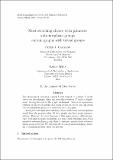Most switching classes with primitive automorphism groups contain graphs with trivial groups
Abstract
The operation of switching a graph Gamma with respect to a subset X of the vertex set interchanges edges and non-edges between X and its complement, leaving the rest of the graph unchanged. This is an equivalence relation on the set of graphs on a given vertex set, so we can talk about the automorphism group of a switching class of graphs. It might be thought that switching classes with many automorphisms would have the property that all their graphs also have many automorphisms. But the main theorem of this paper shows a different picture: with finitely many exceptions, if a non-trivial switching class S has primitive automorphism group, then it contains a graph whose automorphism group is trivial. We also find all the exceptional switching classes; up to complementation, there are just six.
Citation
Cameron , P J & Spiga , P 2015 , ' Most switching classes with primitive automorphism groups contain graphs with trivial groups ' , Australasian Journal of Combinatorics , vol. 62 , no. 1 , pp. 76-90 .
Publication
Australasian Journal of Combinatorics
Status
Peer reviewed
Type
Journal article
Collections
Items in the St Andrews Research Repository are protected by copyright, with all rights reserved, unless otherwise indicated.

